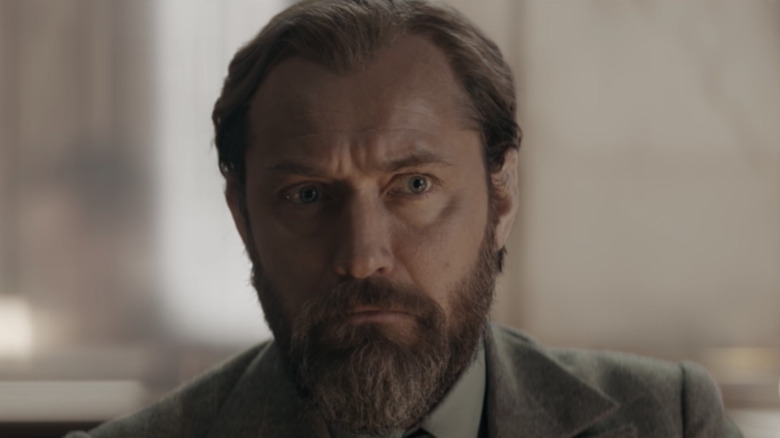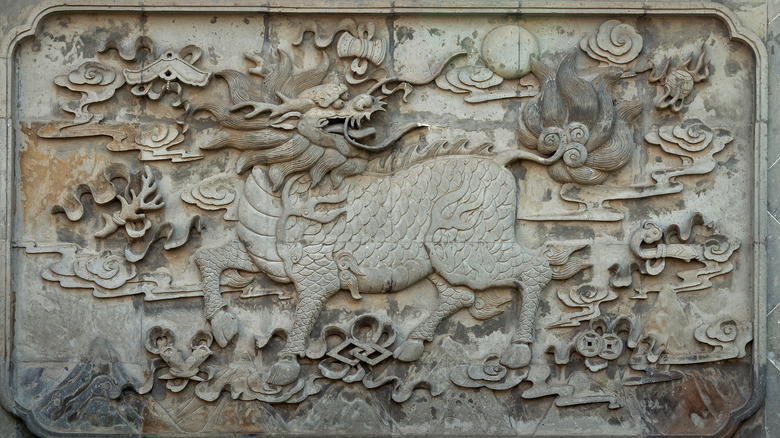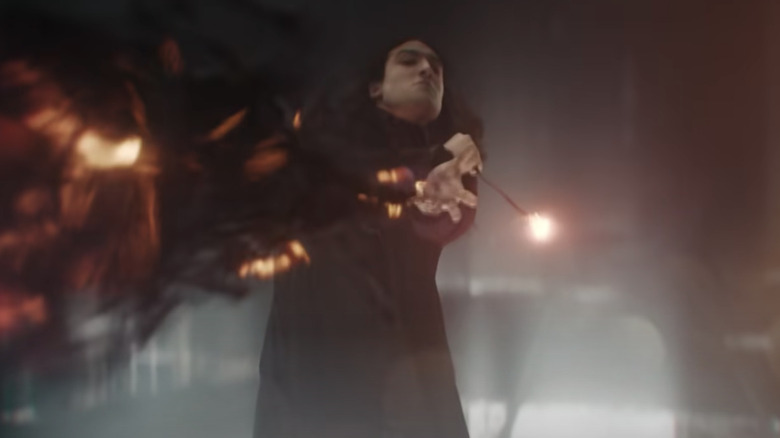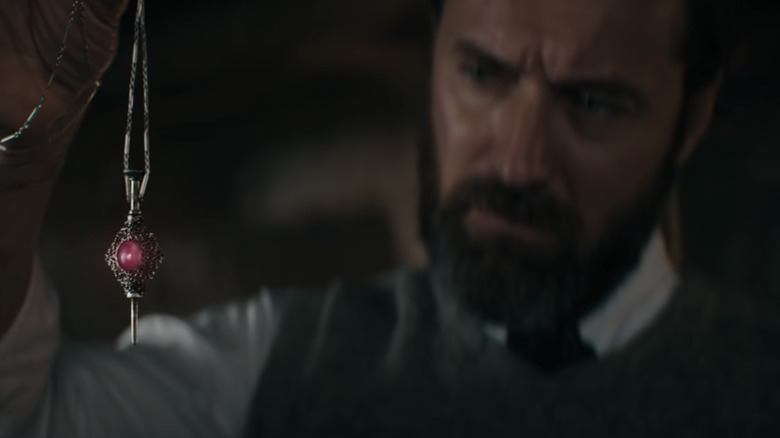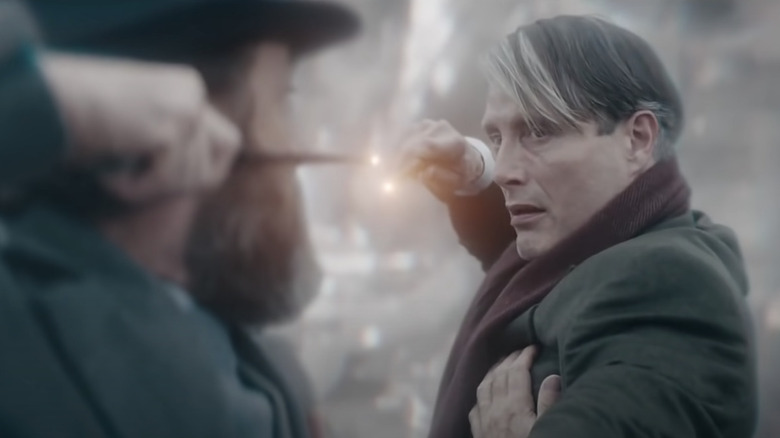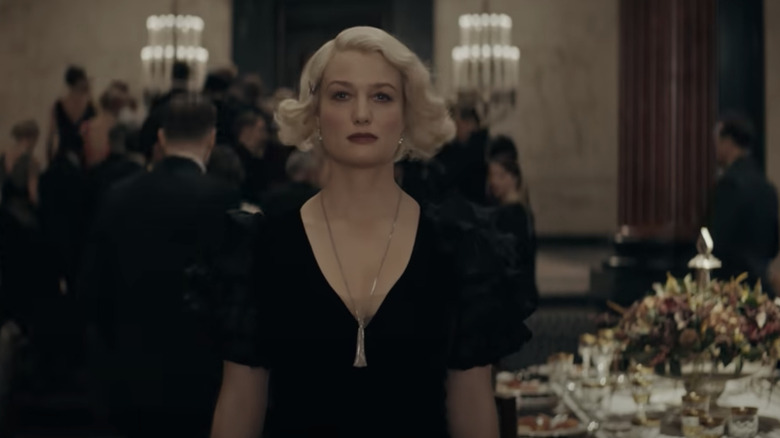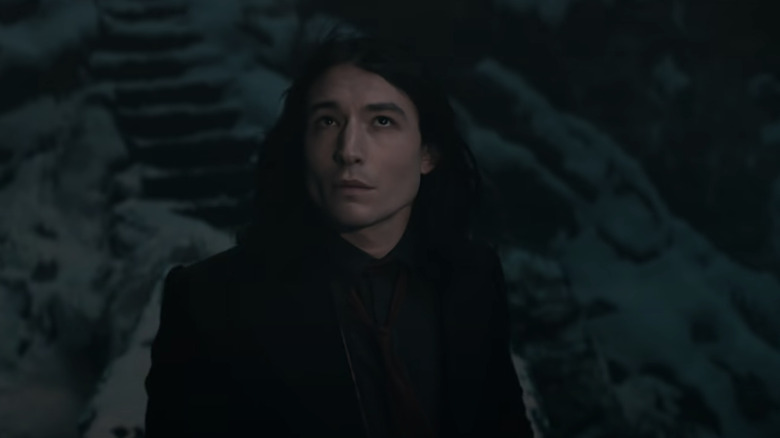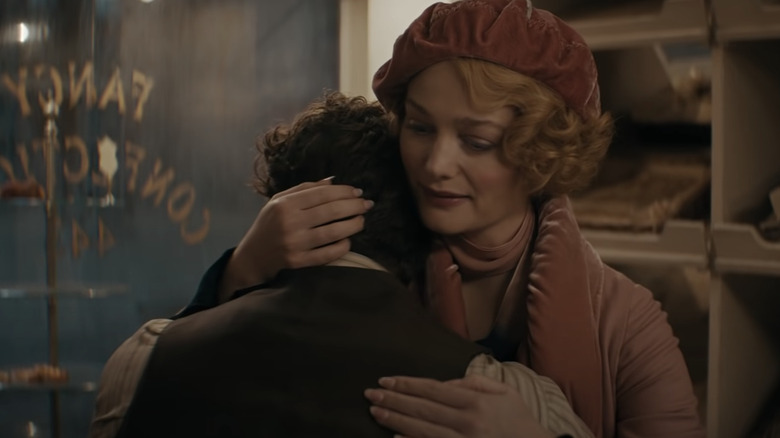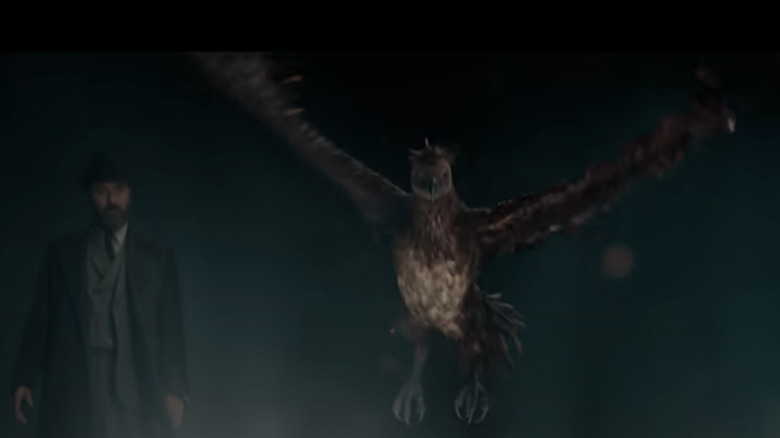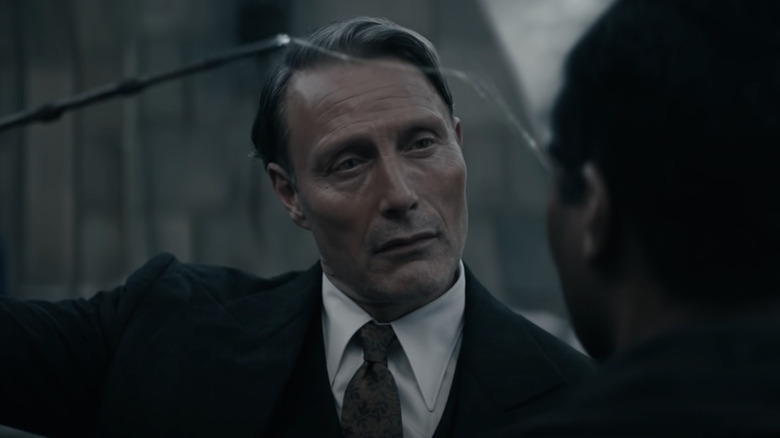The Ending Of Fantastic Beasts: The Secrets Of Dumbledore Explained
Unsurprisingly, the aptly-titled film "The Secrets of Dumbledore" is packed with more than a few secrets — and even more plot points. While the first "Fantastic Beasts" film is relatively straightforward, the second received a slew of fan criticism for its mangled plot. However, the third addition to the franchise warrants a few viewings to fully digest the movie's plot, twists, and implications. That's the beauty of the movie and its many homages to the original "Harry Potter" books and films.
With a film bustling with new and old characters, a menagerie of newly-introduced creatures, and a deep dive into the finally confirmed romantic history between Dumbledore and Grindelwald, there's a lot to unpack in "The Secrets of Dumbledore." While the ending may seem self-explanatory at first glance, there are more than a few hidden nuances and more profound meanings when you look at where these characters, and the wizarding world as a whole, stand.
We may know where the wizarding world ends up in about 50 years when Harry gets his Hogwarts letter, but there's still a great deal to explore before then. For fans looking for some guidance on how to interpret the film's ending, here are some of the symbols, motivations, and implications of "The Secrets of Dumbledore" ending explained. Warning: Spoilers ahead.
The unspeakable word: Ariana
What really happened to Ariana all those years ago? We might not get a clear-cut picture of precisely what went down with Dumbledore and Aberforth's beloved sister. However, we learn quite a bit more about what happened during her death — along with a host of unpleasant implications. In the "Harry Potter" series, Dumbledore avoids the topic of his fallen sister like a severe case of dragon pox. Yet Aberforth rebuffs Dumbledore's attempts to discuss their sister in "The Secrets of Dumbledore," while the future headmaster wants to keep their sister's memory alive.
Dumbledore even opens up to Newt and Theseus about the dreadful event, saying that he and Aberforth foolishly drew their wands without seeing their sister come down the stairs. "One minute she was there, next she was gone," Dumbledore recalled. To make matters creepier, Grindelwald laughed as the brothers dueled. Given the future dictator's desire to get Dumbledore to leave with him, the scene unfolding implies a darker possibility: Could Grindelwald have murdered Ariana, on purpose or knowingly let it happen?
Another possibility is that Aberforth knows which spell killed his sister (possibly his own), explaining his continued grudge against Albus and his refusal to talk about Ariana. Yet despite the unwavering whodunnit aspect of it all, we do discover something else: Ariana was an obscurial. Regardless of who ended her life, her fate was already sealed. Ariana was already 14 when she died, making her older than most obscurial children. According to Dumbledore, phoenixes only come to the family when they are actively dying. Ariana likely had no more than a few months left of her tragic young life, making the resulting feud between Aberforth and Dumbledore that much sadder and preventable. However, if Ariana died when her obscurus consumed her, she might have unintentionally taken one or both of her siblings with her.
The mythology of the Qilin
There are quite a few new creatures in "The Secrets of Dumbledore," but in typical Wizarding World fashion, creatures that may be new to viewers are typically older than they seem. The most significant creature addition to the third "Fantastic Beasts" film is the Qilin — a magical chimera-like beast originating in Chinese, Korean, and Japanese folklore (per Thought Co.). However, the idea to weave the creature's presence into the film's high-stakes election isn't without historical significance. The real-life mythos surrounding the Qilin is precisely what we see play out in "The Secrets of Grindelwald."
In Chinese mythology, the birth of a Qilin was said to mark the birth or demise of a kind and just leader. While the gist remains the same in "The Secrets of Dumbledore," the film minutely tweaks the folklore. Instead of arriving near the birth of a future leader, Wizarding World Qilins are born when a worthy leader is about to rise up. They mark a time of political change and assist wizards in choosing a new leader. As Newt explains, "She can see into your soul. If you are good and worthy, she'll see that. But if you're cruel and deceitful, she'll sense that, too."
In fact, the Qilin's significance to Chinese history is so abundant that their mythology extends to creating the country's written language. It makes sense that the Qilin would play a part in the Wizarding World's ancient ritual of choosing a leader, as the elections have historically taken place in the Kingdom of Bhutan — a Buddhist kingdom located in the Himalayas.
Aberforth's neglected child
Credence's mysterious lineage has been one of the most vital questions posed throughout the "Fantastic Beasts" franchise. Who are his parents? What happened to them? Why was he abandoned? Though we don't have answers to all of these questions, we now know one thing: Credence (AKA Aurelius) is Aberforth Dumbledore's son. While Grindelwald reveals Credence's genealogy in "The Crimes of Grindelwald," the guy is a wannabe dictator even at that point. So fans took Grindelwald's assertions with a grain of salt. However, both Aberforth and Dumbledore confirm Credence's status as a Dumbledore in the third film.
Despite Aberforth constantly criticizing Albus (who was a teenager at the time) for wanting to leave with Grindelwald instead of looking after Ariana, he basically abandoned his son. Dumbledore mentions the rumors of a child surrounding a girl from Godric's Hollow. Of course, she just so happened to have a fling with Aberforth before getting sent away. Credence is in clear communication with Aberforth at the start of "The Secrets of Dumbledore," sending messages in the mirror, implying Aberforth's knowledge of precisely who his son is. Even worse, at the end of the film, Credence asks, "Did you ever think about me?" In a cringe reference to Snape, Aberforth says, "Always."
So let's get this straight. Aberforth knew that he had a son, possibly since his birth, and didn't lift a wand to find him? Credence is bound to meet the same messy demise as Ariana in a sick twist of fate, all because Aberforth failed to seek out his son and train him to use magic. For a man who deeply enjoys criticizing the actions of others, he was pretty negligent toward his own child. Sure, Aberforth would have been a teenager himself when Aurelius was born, but it's been at least 20 years. He expected Albus to give up his life for Ariana as a teenager but failed to parent his own child for the better part of two decades. Aberforth takes his son home the end, but at this point, it's too late, and Credence is already dying.
Dumbledore rejects power
There's no way around it: The Qilin bowing to Dumbledore was fan service in action. The fact that the Qilin chooses Dumbledore at all proves that the wizarding world should definitely use more than a magical creature to select their next leader. Dumbledore has repeatedly demonstrated that dominion seduces him and he shouldn't be in a leadership position. His quick refusal of that power warrants ten points to Gryffindor for his acknowledgment of his fatal flaw. Likewise, his refusal to accept the power that he doesn't think he can handle is a noble choice. That being said, you can argue that he does deserve the Qilin's ruling.
Yet Dumbledore himself admits that people who seek power shouldn't have it — and the fact that the Qilin so rarely bows for anyone is a testament that its criteria should be a bit higher than what Dumbledore has to offer. The Qilin also doesn't bow for him in the Hog's Head, making it weirder. Of course, the best part of Dumbledore's rejection scene comes when Grindelwald is visibly irritated with Dumbledore for refusing the Qilin's offer to lead. It's pretty clear why these two are exes.
At the end of the day, Vicência Santos seems to be the right call for Supreme Mugwump. She keeps her composure, respects democracy, and she honors all life. When Grindelwald uses the Cruciatus Curse on Jacob, she's the only one who stands against him to end the spell. Her willingness to do what's right despite the crowd's approval of Grindelwald's cruelty marks her bravery and leadership.
The result of the blood troth
One of the greatest uncertainties going into "The Secrets of Dumbledore" hinged on how exactly Dumbledore and Grindelwald would face off against each other. The former lovers made a binding blood troth to prevent such a thing, and as we see at the beginning of the film, the blood troth isn't playing around. Of course, in addition to being a hurdle both men have to maneuver around, the troth is also a symbol of Dumbledore and Grindelwald's devotion toward each other — something that still exists, despite being on opposite sides of the upcoming war. Until this movie, Dumbledore has been resistant to take a stand against Grindelwald — not just because he can't, but because he doesn't want to.
When Dumbledore and Grindelwald face-off, a heart appears in the blood troth, and the beating of two hearts plays out over the sounds of battle. Both wizards hesitate, but the damage is done, and the vial breaks — a clear symbol of Dumbledore's heart breaking in the process. Grindelwald adds salt in the wound, saying, "Who will love you now, Dumbledore?" Yet even with all of the implications from their duel, it's unclear how much, if at all, Grindelwald is capable of selfless love.
When asked how Dumbledore could move against Grindelwald when the troth was still intact, the professor says, "He sought to kill. I sought to protect. Our spells met. Let's call it fate." But, fate or not, at the insistence that Dumbledore will one day defeat Grindelwald, he looks pretty miserable at the prospect.
Dumbledore and Grindelwald duel
"The Secrets of Dumbledore" may be the first time Dumbledore and Grindelwald raise their wands against each other, but it won't be the last. In one of the most epic duels we've seen in the "Fantastic Beasts" series thus far, the once partners accept their fate as enemies, albeit a little halfheartedly. They can only duel after Grindelwald fires a killing curse at either Vicência Santos after she wins the election or Credence in vengeance for failing him. Of course, Dumbledore can't sit around and watch his ex-lover murder someone, so he takes a stand, locking the two in battle.
It's important to not that neither wizard casts a killing curse. Both men cast reddish spells, and there's no Avada Kedavra green in sight — not even after the blood troth breaks. So, it seems as though Grindelwald's call for Dumbledore's death might have been a bit premature, and it's implied that Gellert doesn't want Dumbledore dead. Sure, he may have enlisted Credence to kill his uncle. Still, perhaps he knew all along that the obscurial wasn't capable of cold-blooded murder — or even strong enough to take on Dumbledore in his deteriorating state. Grindelwald noted earlier that Credence's "Pain is his power," but pain or not, the guy can barely stand upright.
Despite the brilliant canonization of Gellert and Albus' former relationship, Grindelwald's affection for Dumbledore has always appeared somewhat calculated and selfish. However, he discards the small window he has to kill Dumbledore himself, who probably wouldn't have been ready to meet Gellert with the same amount of force. Maybe Grindelwald really hoped that Credence would follow through on his command to kill Dumbledore, but only because he's seemingly incapable of doing it himself. Or maybe Grindelwald secretly hoped he would fail and spare his lover. Either way, it looks like Grindelwald might be more capable of love and loyalty than fans thought. Yet that doesn't take away the fact that he's a cold-blooded murderous dictator.
Queenie's redemption
From the very first moment we see Queenie onscreen in "The Secrets of Dumbledore," it's clear that she's miserable. For someone as whimsical and kindhearted as Queenie, hearing the thoughts of Grindelwald's vilest followers had to be torture for the Legilimens. Yet despite remaining in Grindelwald's flock, her work for the resistance is already well underway.
Though watching Grindelwald slit the Qilin's throat may be the witch's final straw that breaks her last tether of support, she was already well underway in thwarting Grindelwald's quest for total control. She admits to Credence that she doesn't tell Grindelwald everything. She's clearly Credence's only ally in the mansion, which likely assists his own defection from Grindelwald.
When Queenie sees Jacob again right before the election, she's insistent that she can't be saved and that "Some mistakes are too big." Jacob responds, "Dumbledore says I have a full heart, but I always got room in there for you." Yet even before her last defenses crumble after Jacob forgives her, Queenie might have made a crucial decision for the resistance. While it's unclear how Yusuf thwarts Grindelwald when he takes Leta's memories from, Queenie vouches for him. However, there's a tiny moment where they lock eyes and seem to share an understanding glance. There's a genuine chance that Yusuf telepathically tells Queenie his infiltration plans, and she backs him up as a small way to undermine Grindelwald. And without Yusuf, the election plan would have failed.
Grindelwald is alone
Grindelwald goes from having some of the most powerful wizards of his time at the dark wizard's disposal to standing relatively alone in his quest for power. Dictators rise through the ranks through manipulation, playing people's fears against them, and exploiting someone's deepest desires. So, what does Credence want? A family. And how does Grindelwald secure his loyalty? He uses his loneliness, plays off his abandonment issues, and paints the Dumbledores in a less than ideal light — which, granted, isn't entirely unfair.
As for Queenie, she only joins Grindelwald when he promises her a better future for herself and Jacob. Of course, we know Grindelwald's hatred for muggles would never allow that, which he makes abundantly clear when he tortures Jacob with the Cruciatus Curse. However, Grindelwald's fatal flaw is that he tries to take power far too prematurely. Grindelwald was already gaining hundreds of followers before he attempts to win the election with his murdered Qilin. In fact, had he not aimed to deceive every wizard in the wizarding world, he may have won the election for Supreme Mugwump without using the Qilin. Yet he takes the easy route, which fractures the already unstable loyalty of his followers when his devious plot unravels.
Grindelwald's premature self-sabotage puts him in a unique position that we haven't yet seen from a Wizarding World villain: He's standing alone. Sure, his support isn't wholly diminished, but he's lost his most powerful supporters, and he has to start from square one in his quest for domination.
Something worth fighting for
One of the most goosebumps-inducing lines from the original series comes when Harry says, "Even though we've got a fight ahead of us, we've got one thing that Voldemort doesn't have — something worth fighting for." If there's one thing that the "Harry Potter" series drilled into fans' heads, it's that love is the most extraordinary power. After all, Lily's love for her son is so tangible that it leaves him with magical protection long after she's gone. Given that both franchises depict a dictator's rise, both fans and characters need a reminder of what exactly they're fighting for.
Grindelwald has just used the Cruciatus curse on Jacob. He's just declared war on the muggles. He goes on a tirade, calling muggles vermin who dilute the wizarding bloodline. Yet despite all of that hateful rhetoric and the odds stacked against Queenie and Jacob as a muggle/witch pairing, they throw all of that drama aside, choosing each other. Sure, the wedding is cute and sweet and provides another will they/won't they moment for Tina and Newt. But all of that aside, this wedding is a statement that Grindelwald's threats will not cow them, and they know exactly what they're fighting for. On the flip side, Grindelwald has forsaken love for war and power, which is the greatest tragedy of all — and a waste of a powerful man who could do so much good in the world had he chosen a different path.
Rising from the phoenix's ashes
Back in "Harry Potter and the Chamber of Secrets," both fans and Harry Potter himself first meet a phoenix on his dying day. But just as quickly as we watch the bird erupt into flames, the phoenix is quickly reborn. The phoenix has long since been a symbol of new beginnings, and the mythical bird's appearance in "The Secrets of Dumbledore" is no different. Not only does the phoenix aptly symbolize Credence's change of heart, but it also has more than a few implications for Dumbledore.
It's not yet clear whether or not the phoenix in "The Secrets of Dumbledore" is actually Dumbledore's future phoenix Fawkes. However, it's clear that the professor is drawn to the bird. Dumbledore stares at it more than a few times — particularly after his skirmish with Grindelwald. Even in "The Deathly Hallows," Dumbledore still carries some affection toward Grindelwald. Yet, at some point, he has to choose: stay with his lover and doom the world, or do what is right, not what is easy.
Of course, we know that Dumbledore does the latter, and the former lovers become enemies. However, Dumbledore's moment with the phoenix is a less-than-subtle hint at his clean slate. As much as it may pain him, he's finally ready to move on from Grindelwald and stand against the dictator when the time comes — and the wizarding world will thank him for it.
The woven impact of memory
Given that the "Fantastic Beasts" series is a prequel franchise, it's no surprise how deeply memories play a role. The concept of memory and the past fully weave through "The Secrets of Dumbledore," banking on nostalgia for the "Harry Potter" series alongside the characters' own pasts. Before the ragtag group sets off to stand against Grindelwald, Dumbledore says, "If you listen carefully enough, the past whispers to you." That's essentially what this franchise, and especially this particular film, sets out to do.
It's not just through metaphor that the movie tackles this concept, though. Grindelwald is perhaps driven by his own history with Dumbledore and how he views their relationship as a weakness. To that end, he removes Yusuf's memories of Leta, hoping that it will be enough to cur his favor and support. Yet memory, and love for that matter, are more complex than that, and Yusuf is able to thwart Grindelwald. However, his memories of Dumbledore and the time they shared win out against Grindelwald's own thirst for power. As a result, he's unable to finish his halfhearted war against Dumbledore.
At its core, "The Secrets of Dumbledore" relays that you can't escape your past, and you can't chop up your memories into sections and pick and choose which parts you want to acknowledge. At the end of the day, your past will catch up with you, your feelings will make themselves known, and then ultimately, it's your choice what you do with those parts of yourself. Had Aberforth acknowledged his past and pain from Ariana, maybe he could have prevented his son from following in her footsteps. Had Grindelwald listened to his heart, perhaps he wouldn't be trying to dominate the world.
